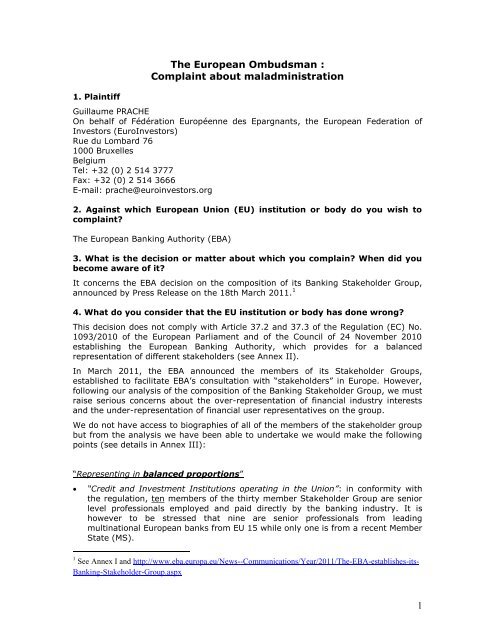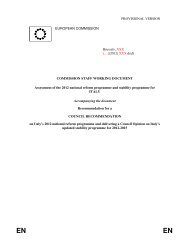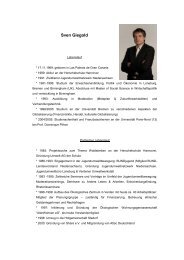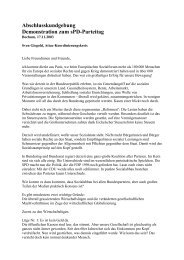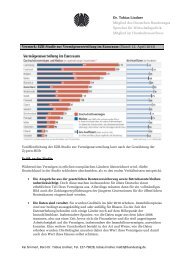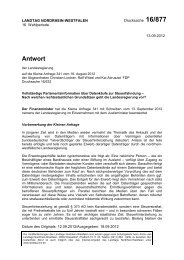The European Ombudsman : - Sven Giegold
The European Ombudsman : - Sven Giegold
The European Ombudsman : - Sven Giegold
You also want an ePaper? Increase the reach of your titles
YUMPU automatically turns print PDFs into web optimized ePapers that Google loves.
1. Plaintiff<strong>The</strong> <strong>European</strong> <strong>Ombudsman</strong> :Complaint about maladministrationGuillaume PRACHEOn behalf of Fédération Européenne des Epargnants, the <strong>European</strong> Federation ofInvestors (EuroInvestors)Rue du Lombard 761000 BruxellesBelgiumTel: +32 (0) 2 514 3777Fax: +32 (0) 2 514 3666E-mail: prache@euroinvestors.org2. Against which <strong>European</strong> Union (EU) institution or body do you wish tocomplaint?<strong>The</strong> <strong>European</strong> Banking Authority (EBA)3. What is the decision or matter about which you complain? When did youbecome aware of it?It concerns the EBA decision on the composition of its Banking Stakeholder Group,announced by Press Release on the 18th March 2011. 14. What do you consider that the EU institution or body has done wrong?This decision does not comply with Article 37.2 and 37.3 of the Regulation (EC) No.1093/2010 of the <strong>European</strong> Parliament and of the Council of 24 November 2010establishing the <strong>European</strong> Banking Authority, which provides for a balancedrepresentation of different stakeholders (see Annex II).In March 2011, the EBA announced the members of its Stakeholder Groups,established to facilitate EBA‟s consultation with “stakeholders” in Europe. However,following our analysis of the composition of the Banking Stakeholder Group, we mustraise serious concerns about the over-representation of financial industry interestsand the under-representation of financial user representatives on the group.We do not have access to biographies of all of the members of the stakeholder groupbut from the analysis we have been able to undertake we would make the followingpoints (see details in Annex III):“Representing in balanced proportions”“Credit and Investment Institutions operating in the Union”: in conformity withthe regulation, ten members of the thirty member Stakeholder Group are seniorlevel professionals employed and paid directly by the banking industry. It ishowever to be stressed that nine are senior professionals from leadingmultinational <strong>European</strong> banks from EU 15 while only one is from a recent MemberState (MS).1 See Annex I and http://www.eba.europa.eu/News--Communications/Year/2011/<strong>The</strong>-EBA-establishes-its-Banking-Stakeholder-Group.aspx1
“<strong>The</strong>ir Employees’ Representatives as well”: we do not question the appointmentof employees‟ representatives, as this is required by Article 37 and because theyrepresent their own interests which are not necessarily those of their employers.However we would like to underline that employees of the banking industry arenot economically independent from it.“As well as Consumers”: the implementation by EBA of this provision gives rise toserious problems indicating that EBA has not granted sufficient attention to thenotion of consumer representativity:- one of the designated consumer representatives is actually an academic,another one works for a think tank: they do not represent consumers andnever did it in the past.- <strong>The</strong> other three consumer representatives come exclusively from verysmall consumer associations located in recent EU Member States whileseveral applications from the more affluent and experienced nationalconsumer associations were submitted to EBA and not selected. While wevery much support the principle of ensuring that smaller countries arerepresented, it is important to recognize that these members will not haveaccess to the same level of expert support and resources to challenge theindustry representatives - including bank industry representatives fromthe international “mega” banking groups such as Deutsche Bank or BNPParibas.Five “Users of banking services”: the five chosen persons are not “users” ofbanking services; they actually are “providers” from influential organizations thatsupply services to banks. <strong>The</strong> description of these paid service providers to thebanking industry as “users” is at the very least misleading and contradicting theRegulation. Users of banking services refer to the notion of customers of suchservices. This is clear in article 37. 2 of the Regulation, and the Recital 48 (seeannex II) is even clearer and more precise: “and other financial institutions whichthemselves use financial services, (…) and other retail users of banking services”should be represented in the Group in addition to “consumers”. And there is notany mention of providers or suppliers.In particular, in the EBA Stakeholder Group there are no representatives of thePan-<strong>European</strong> financial services users‟ associations despite their applications. Weare also surprised not to see any representative of companies who are bankcustomers in this sub-group, such as major retailers or their associations.EBA seems therefore to have seriously mistaken “users” of banking services withbanking industry executives themselves and with providers to this industry.Nevertheless, there is no ambiguity at the EU level in the term “users” ofservices. We refer to the above mentioned Recital 48 and - for example – to thecreation of the “Financial Services Users Group” (FSUG) in 2010 by the <strong>European</strong>Commission, which does not include any representatives of the financialindustries or any of their providers.“And Representatives of SME”s: one of the three representatives of SMEs is froma <strong>European</strong> federation that also represents the interests of the bankingfederations that are members of this federation.“At least five of its members shall be independent top-ranking academics”: itseems that the economic independence of one of them who works for a thinktank partly funded by the financial industry is questionable. We could not checkthe economic independence of the other four from the financial industry as EBAdid not communicate their resumes.2
“Ten of its members shall represent financial institutions, three of whom shallrepresent cooperative and savings banks”: except the fact that only one memberof this sub-group comes from a recent MS, we can notice that, concerningnumber and expertise, the requirements of Article 37 are met only for this subgroup.“Ensuring, to the extent possible”,“An appropriate geographical (balance)”: 8 of 30 members come from UK; 5 outof 30 members come from EU12;“And a gender balance”: 10 of the 30 members are women; “And representation of stakeholders across the Union”: there is only one of 10representatives of credit and investment institutions from recent Member Stateswhile there is no consumer representatives from the EU 15. More generally thedemand side is underrepresented while the banking sector and its providers areoverrepresented.In our view, the make-up of the Banking Stakeholder Group falls well short of theintentions expressed in many public statements made by <strong>European</strong> Authorities sincethe financial crisis, committing to make the voice of financial services users “muchmore strongly heard on all financial issues”, and to restore balance between therepresentation of financial services providers and that of users 2 .<strong>The</strong> disproportion in the Banking Stakeholder Group goes against both the spirit ofthe EU legislator and the wording of new financial supervision regulations (see AnnexII) which require a balanced proportion between the representatives of financialservices providers and financial services users.As a matter of fact, the 30 member Group is heavily overweighed towards thepersons paid by the banking industry or by its suppliers with at least 15 members,versus only 3 representing consumers and users in general. When the group willhave to issue an opinion, advice EBA, or decide on the agenda of its meetings,because of the dominance of industry representatives and its suppliers, it will beimpossible for the rest of the group to make up a majority. <strong>The</strong>re is a serious riskthat the membership vote will always lean on the same side.As a result, this creates a serious risk of the EBA failing to properly understand theneeds and interests of ordinary financial users and could undermine effectivepolicymaking.5. What, in your views, should the institution or body do to put things right?EBA should reconsider the composition of the Banking Stakeholder Group at oncewithout waiting for the renewal of this group foreseen in 2013. <strong>The</strong> new stakeholdergroup should be composed in balanced proportions and the users of banking servicesshould be real users of those services – and not providers of services to the industry.It is also important to avoid potential conflicts of interests.2 See for example Annex IV: 4 March 2009 « Driving EU recovery » communication from the EC, AnnexI, page 4: «<strong>The</strong> interests of <strong>European</strong> investors, consumers and SMEs, must be at the centre of the reform…<strong>The</strong> Commission will ... ensure that the voice of <strong>European</strong> investors is much more strongly heard on allfinancial issues”.3
Even if the concept of balanced proportions is not defined by the Treaty or a previousdirective, it is not new in the EU context. <strong>The</strong> Commission‟s White Paper on <strong>European</strong>Governance 3 , published in July 2001, mentions that – in order to „reduce the risk ofthe policy-makers just listening to one side of the argument or of particular groupsgetting privileged access… 4 , – the Commission will adopt minimum standards forconsultation and publish them in a code of conduct. <strong>The</strong> subsequent Commission‟sCommunication on „General principles and general standards for consultation ofinterested parties‟ 5 lays down the principles of equitable consultation. Under thoseprinciples:In determining the relevant parties for consultation, the Commission should take intoaccount the following elements as well: … the need for specific experience, expertise or technical knowledge, whereapplicable the need to involve non-organised interests, where appropriate the track record of participants in previous consultations the need for a proper balance, where relevant, between the representatives of:o social and economic bodieso large and small organisations or companieso ….As the stakeholder group is established to „facilitate consultation with stakeholders inareas relevant to the task of the Authority’ (Art. 37, 1. ; Regulation 1094/2010establishing the EBA), the Commission‟s White Paper and Communication areadequate sources of inspiration to interpret rightly the concept of balancedproportions.Additionally, in order to insure full transparency and prevention of conflicts ofinterests we would like the CVs of chosen members of stakeholder groups to bepublished on EBA website together with the criteria that were taken into accountwhile recruiting.6. Have you already contacted the EU institution or body concerned toobtain redress?YesOn 4 April 2011, we sent a letter (see Annex V) to the EBA Chairman raising ourconcerns on its decision and asking him to reconsider the composition of the EBAbanking stakeholder group. On 26 April 2011, we received a response we considerunsatisfactory (see annex VI).3 <strong>European</strong> Governance – A white Paper, 25/07/2001, COM(2001) 428 final.http://eur-lex.europa.eu/LexUriServ/site/en/com/2001/com2001_0428en01.pdf4 <strong>European</strong> Governance – A white Paper, 25/07/2001, COM(2001) 428 final, p. 17.5 Communication from the Commission towards a reinforced culture of consultation and dialogue - Generalprinciples and minimum standards for consultation of interested parties by the Commission, 11/12/2002,COM(2002) 704 final, p. 20.http://eur-lex.europa.eu/LexUriServ/LexUriServ.do?uri=COM:2002:0704:FIN:EN:PDF4
7. If the complaint concerns relationships with the EU institutions or bodies;have you used all the possibilities for internal administrative requests andcomplaints provided for in the Staff Regulations? If so, have the time limitsfor replies by the institutions already expired?No, not relevant in this case8. Has the object of your complaint already been settled by a court or is itpending before a court?No9. Please select one of the following two options after having read theinformation in the text below:Please treat my complaint publicly10. Do you agree that your complaint may be passed on to anotherinstitution or body (<strong>European</strong> or national), if the <strong>European</strong> <strong>Ombudsman</strong>decides that he is not entitled to deal with it?YesDate and signature:Brussels 14/09/2011List of attachments:1. Annex I - Press Release on the establishment and composition of EBA‟sBanking Stakeholder Group announced by on 18 March 20112. Annex II - Article 37 and Recital 48 of the Regulation (EC) No. 1093/2010 ofthe <strong>European</strong> Parliament and of the Council of 24 November 2010 establishingthe <strong>European</strong> Banking Authority3. Annex III - Analysis of the EBA Banking Stakeholder Group published list ofmembers4. Annex IV - 4 March 2009 « Driving EU recovery » communication from theEC5. Annex V - EuroInvestors‟ letter to the Chairman of EBA, Mr. Andrea Enria6. Annex VI - Reply from the Chairman of EBA, Mr. Andrea Enria toEuroInvestorsComplaints to the <strong>European</strong> <strong>Ombudsman</strong> (and any annexed documents) are normally dealt with publicly.„Dealing publicly‟ with a complaint means that any member of the public may have access to the complaint and itsannexes. If the <strong>Ombudsman</strong> opens an inquiry, the opinion of the institution or body concerned on the complaint, anyobservations on the opinion made by the complainant, as well as other documents mentioned in Article 14 of theImplementing Provisions (available on the <strong>Ombudsman</strong>‟s website) are public documents to which any member of thepublic may have access on request. <strong>The</strong> <strong>Ombudsman</strong>‟s decisions on complaints are published on his website with the5
complainant‟s name removed. Some are also published in full, or in summary form, in hard copy and electronic formats.<strong>The</strong>se publications do not include the complainant‟s name or address.A complainant has the right to request that his or her complaint be dealt with confidentially. If confidentiality isrequested, there is no public access to the complaint or to the other documents mentioned above. However, even aconfidential complaint must be sent to the Union institution or body concerned, if the <strong>Ombudsman</strong> begins an inquiry. <strong>The</strong><strong>Ombudsman</strong>‟s decisions on confidential complaints are published on his website, after the removal of any informationwhich could lead to the identification of the complainant. This information is also removed if the decision is published infull, or in summary form, in a hard copy or electronic format.Complaints to the <strong>Ombudsman</strong> may contain personal data relating to the complainant, or to a third party. <strong>The</strong> processingof personal data by the <strong>European</strong> <strong>Ombudsman</strong> is governed by Regulation (EC) No 45/2001 (1). Unless the complainantrequests confidentiality, he or she is understood to consent for the purposes of Article 5 (d) of Regulation (EC) No45/2001 to the <strong>Ombudsman</strong> dealing publicly with any personal data which the complaint may contain.(1) Regulation (EC) No 45/2001 of the <strong>European</strong> Parliament and of the Council of 18 December 2000 on the protection ofindividuals with regard to the processing of personal data by the Community institutions and bodies and on the freemovement of such data (OJ L 8, 12.1.2001, p. 1)6


